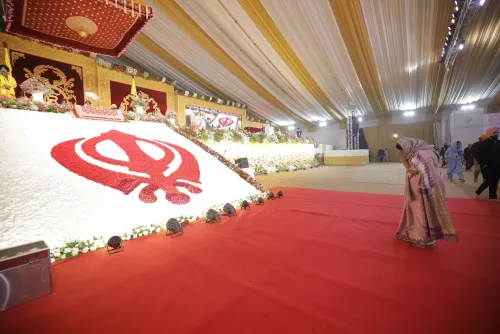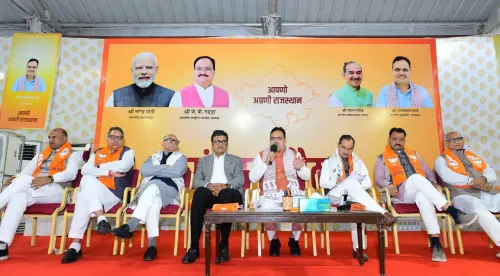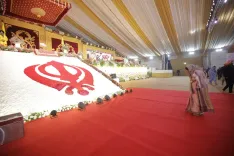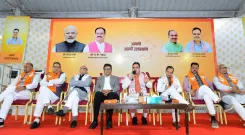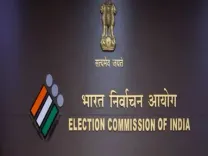Should the Terms 'Socialist' and 'Secular' in the Constitution's Preamble Be Reviewed?
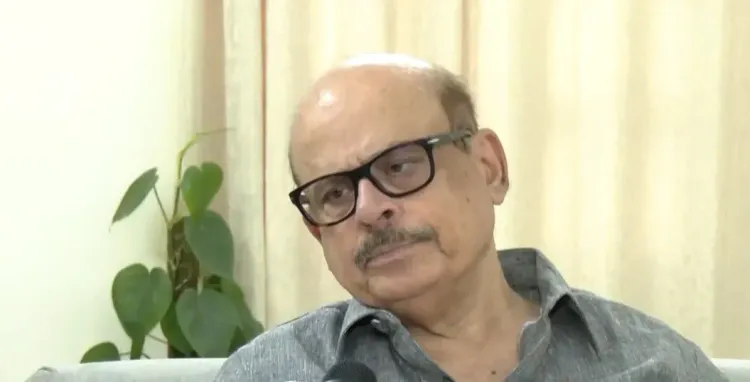
Synopsis
Key Takeaways
- Dattatreya Hosabale calls for a review of 'socialist' and 'secular' terms in the Constitution's Preamble.
- His remarks provoke backlash from Congress and RJD, while getting support from Shiv Sena.
- The terms were added during the Emergency in 1975.
- Debate centers around the historical context and implications for India's identity.
- Resistance against any alteration of these principles is strong among socialist factions.
New Delhi, June 27 (NationPress) A new controversy has emerged following the statement by Rashtriya Swayamsevak Sangh (RSS) General Secretary Dattatreya Hosabale, who suggested revisiting the terms “socialist” and “secular” in the Preamble of the Indian Constitution.
His comments, made during an event in Delhi, have faced strong backlash from the Congress and the Rashtriya Janata Dal (RJD), while Shiv Sena expressed its support for his proposition.
At the Ambedkar International Centre, Hosabale remarked: “The terms ‘socialist’ and ‘secular’ were incorporated into the Preamble during the Emergency. No effort was made to retract them afterward. We need to discuss whether they should stay. I assert this in a building dedicated to Babasaheb Ambedkar, who did not include these words in the original Constitution.”
In an interview with IANS, Shiv Sena leader Shaina NC defended Hosabale's comments, stating: “He is entirely correct. The terms ‘socialist’ and ‘secular’ were not part of the original Preamble crafted by BR Ambedkar. These were added during the Emergency in 1975, when then Prime Minister Indira Gandhi enacted the 42nd Constitutional Amendment. This raises the question—why focus solely on these two terms when India is already a sovereign, democratic republic?”
Shaina further demanded an apology from Congress for the amendments made during the Emergency, asserting: “Shiv Sena calls for a public apology from the Congress party regarding the Emergency. These terms were absent in the original draft, and they should be eliminated.”
Conversely, Congress leader Tariq Anwar criticized Hosabale’s remarks, expressing: “There’s a clear undertone of communalism in his statement. India is intrinsically secular and historically so. The Constitution guarantees equality, voting rights, and freedom of religion. As for socialism, it serves to diminish inequality. We aim to foster a just society, and ‘socialism’ embodies that initiative.”
RJD leader Shakti Singh Yadav also condemned the RSS, accusing it of consistently attempting to undermine the Constitution’s foundational principles.
“The RSS has always sought to alter the Constitution. The BJP merely represents the political face of the RSS, and in power, they are pursuing the RSS’s agenda. Narendra Modi is not just India’s Prime Minister; he embodies the RSS's mission. Their agenda to eradicate socialism and secularism will face resistance from the populace.”
Yadav emphasized that socialist forces in India would oppose any such attempts. “Even if a drop of blood remains in our bodies, no one will dare to eliminate socialism and secularism from the Constitution. These individuals once opposed the Constitution and now parade around with its copy. They should first apologize for their past. This is a direct attack on the essence of the Constitution.”
“The RSS and BJP may talk of constitutional changes, but they must remember—socialists will not remain silent. Our leader, Lalu Prasad Yadav, is the national President of RJD. Don’t underestimate us,” he warned.



